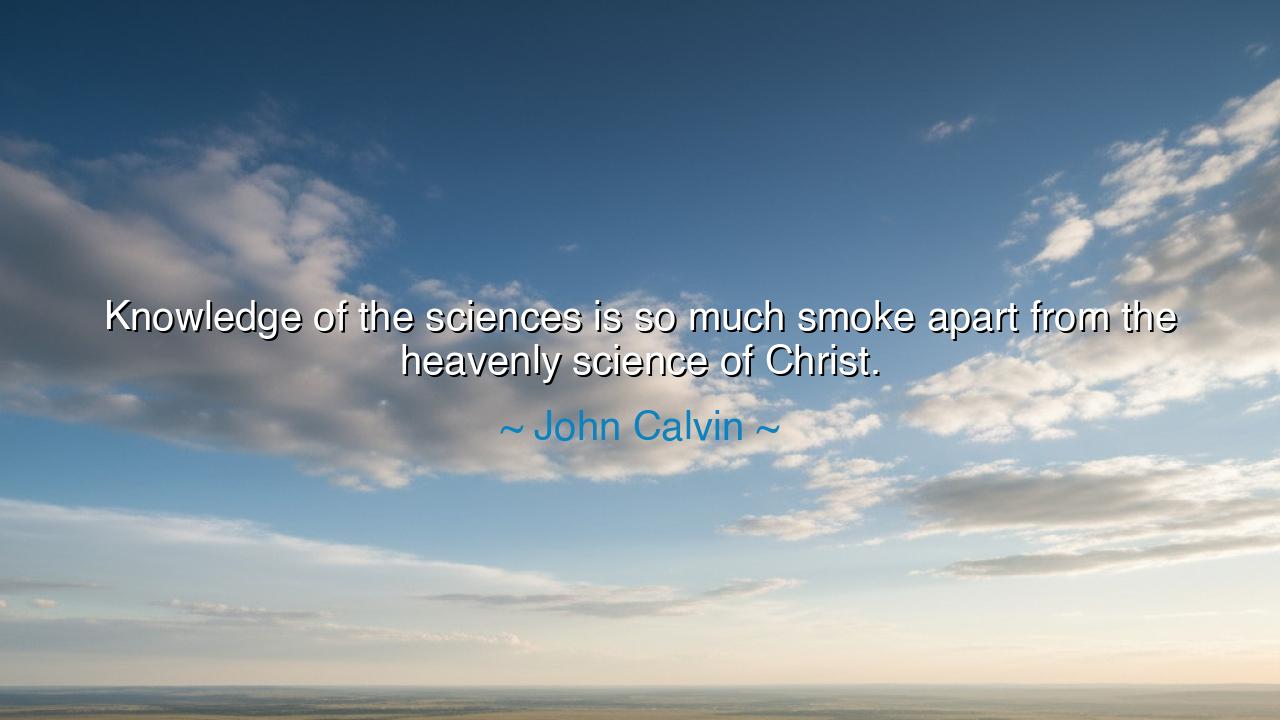
Knowledge of the sciences is so much smoke apart from the






“Knowledge of the sciences is so much smoke apart from the heavenly science of Christ.” – John Calvin
In these solemn and radiant words, John Calvin, the great reformer and theologian, speaks from the depths of a soul that has seen both the brilliance of human intellect and the limits of its reach. His message is not a condemnation of science, but a reminder of perspective—of what endures and what fades. He likens the wisdom of this world to smoke, dazzling for a moment as it rises, yet soon vanishing into nothingness unless it is joined to the eternal flame of divine truth. To Calvin, all the arts, all the philosophies, all the discoveries of mankind are but fragments of light, beautiful yet incomplete, until they are illumined by the heavenly science of Christ—that is, the knowledge of God’s grace, purpose, and redemption.
The meaning of this quote reaches into the very heart of what it means to seek understanding. Human beings have always pursued knowledge: the secrets of the stars, the workings of the body, the laws of nature, the mysteries of the mind. These are noble pursuits, for they reveal the beauty of creation and reflect the image of the Creator within us. Yet Calvin warns that if such learning is detached from its divine source—if man exalts his intellect but forgets his soul—then all his wisdom becomes emptiness. Knowledge, in isolation, may refine the mind, but it cannot heal the heart. The greatest discoveries cannot redeem the spirit. The “heavenly science of Christ” alone reveals the purpose of knowledge: to lead us not into pride, but into worship.
The origin of Calvin’s words lies in the age of the Reformation, a time when the old world was trembling under the light of new ideas. The Renaissance had awakened Europe to the wonders of reason and inquiry; science was beginning to challenge superstition and reshape understanding. Yet Calvin saw a danger in the triumph of intellect—that men, drunk on their discoveries, would forget the One who gave them the power to reason at all. His was not a cry against learning, but a plea for humility: that knowledge should serve faith, not replace it. He believed that all truth is God’s truth—but truth without God becomes smoke, a spectacle that dazzles before it disappears.
History offers us many examples of this tension. Consider the life of Blaise Pascal, the mathematician and physicist who illuminated the laws of probability and the nature of pressure, yet in his later years wrote, “The heart has its reasons which reason knows not.” He too understood what Calvin meant: that the intellect can measure the stars, but cannot measure the soul. The most brilliant scientist may understand the atom and yet be ignorant of love, forgiveness, or eternity. Pascal’s final work, the Pensées, was not a treatise on science, but a meditation on the infinite, on the mystery of God that surpasses the limits of reason. Like Calvin, he knew that the flame of divine truth gives meaning to all other lights.
Calvin’s metaphor of smoke is especially profound. Smoke is not evil—it is evidence of fire, a sign that something burns. But it is fleeting, dissipating without substance. In the same way, human knowledge is not to be despised—it is precious and noble—but it must be anchored to something enduring, lest it rise and vanish without trace. The sciences can reveal the how of creation, but not the why. They can cure the body, but not the soul; they can expand our reach, but not our righteousness. Only through the science of Christ—the study of divine love, mercy, and salvation—can knowledge find its rightful place, as servant to truth and instrument of grace.
This does not mean one must abandon study, but that one must sanctify it. A scholar of faith, Calvin would say, is one who studies the heavens not merely to map the stars, but to marvel at their Maker. The artist who paints beauty, the doctor who heals disease, the thinker who solves mysteries—all these, if done in reverence, partake in the heavenly science. For when we use knowledge to serve life, to heal the broken, to glorify the Creator, it ceases to be smoke—it becomes light. Thus, faith does not destroy learning; it fulfills it.
The lesson is both timeless and personal: seek wisdom, but anchor it in truth. Learn deeply, but love more deeply still. Let your pursuit of knowledge be guided by humility, for knowledge without virtue breeds pride, and pride blinds the soul. Whether you study the stars, the mind, or the human heart, remember that all understanding is but a reflection of the greater mystery that shines through Christ—the wisdom that is not fleeting, but eternal. As John Calvin reminds us, the sciences may fill the mind, but only the heavenly science fills the soul; and it is this, above all, that gives meaning to all knowledge, and life to all light.






AAdministratorAdministrator
Welcome, honored guests. Please leave a comment, we will respond soon